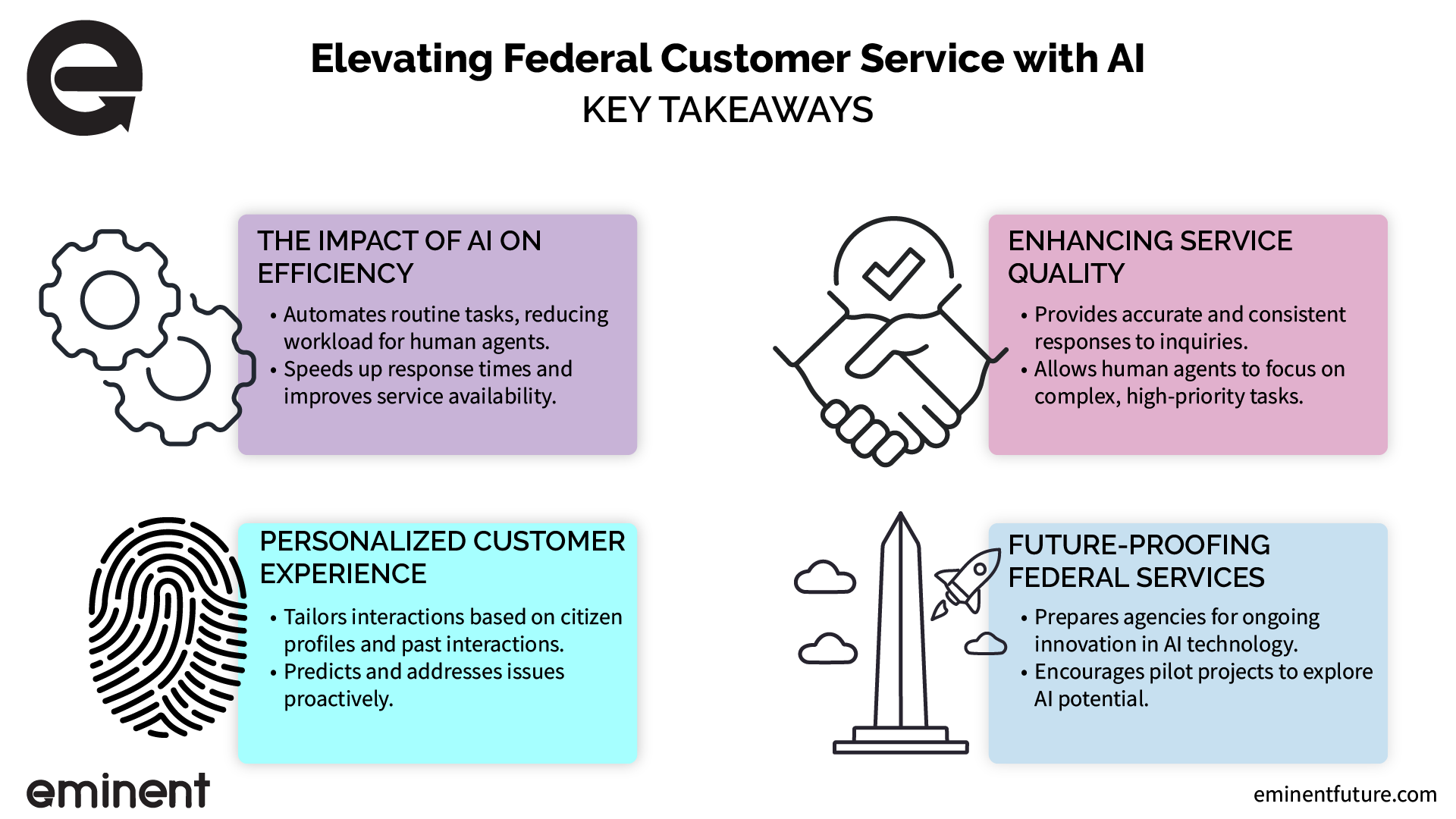In today’s fast-paced digital world, citizens expect the same level of speed, efficiency, and personalization from federal agencies that they receive from the private sector. Whether applying for benefits, seeking information, or resolving issues, the demand for quick and effective service is higher than ever.

Federal agencies, however, face unique challenges in meeting these expectations. Serving a diverse and widespread population, they must navigate complex regulatory environments, limited resources, and the need to provide consistent service across various platforms and channels. This often results in delays, bottlenecks, and frustration among citizens who expect more.
Artificial intelligence (AI) is a transformative tool that can significantly enhance customer service in the federal government. By automating routine tasks, providing quick responses, and allowing human representatives to focus on more complex issues, AI can revolutionize how federal agencies interact with the public.
The Current State of Customer Service in Federal Agencies

Challenges
Federal agencies are tasked with providing essential services to millions of citizens, but the current state of customer service presents several significant challenges.
High Volume of Inquiries and Requests:
Federal agencies receive many inquiries daily, ranging from simple questions to complex issues requiring in-depth assistance. This sheer volume can strain existing resources, making it difficult to provide timely responses.
Limited Human Resources:
Many agencies operate with limited staffing, further complicating their ability to address all issues promptly. The shortage of human resources often means that citizens experience longer wait times, and critical issues may not quickly receive the needed attention.
Complexity of Issues:
Many inquiries require specialized knowledge, especially when dealing with regulatory matters, benefits eligibility, or legal concerns. The complexity of these issues demands a high level of expertise, making it challenging for general customer service representatives to provide accurate and effective assistance without escalating cases to specialists.
Impact
These challenges can lead to several adverse outcomes. Delays in responding to citizen inquiries can result in frustration and dissatisfaction, undermining public trust in the agency’s ability to serve their needs. The strain on limited resources can also increase operational costs, as agencies may need overtime, temporary staffing, or additional training to meet demand. Moreover, the inability to address complex issues efficiently can lead to errors, miscommunications, and even legal complications, further complicating the agency’s operations and eroding citizen confidence.
The Role of AI in Automating Routine Tasks
AI is increasingly recognized as a powerful tool to streamline and improve customer service in federal agencies by automating routine tasks. This allows human representatives to focus on more complex and critical issues.

AI-Powered Chatbots:
- Automate responses to frequently asked questions, reducing the need for human intervention.
- Provide 24/7 support for everyday inquiries, ensuring citizens receive timely assistance regardless of when they reach out.
- Example: A federal agency using AI chatbots to handle inquiries about benefits or application statuses, allowing human agents to focus on more specialized cases.
Data Entry and Processing:
- AI systems can handle routine data entry, which is often time-consuming and prone to human error.
- This automation frees human agents to engage in more complex tasks requiring critical thinking and specialized knowledge.
- Example: Automating the processing of standard forms or applications, reducing turnaround times, and increasing accuracy in handling citizen requests.
Enhancing Service Quality Through AI-Driven Insights
AI offers powerful tools for federal agencies to enhance service quality by leveraging data-driven insights. One key area where AI can make a significant impact is predictive analytics.

Predictive Analytics
AI can analyze large volumes of data from customer inquiries, identifying patterns and trends that might take time to be noticeable. By examining this data, AI systems can predict and address emerging issues before they become widespread. For instance, if a question or problem begins to surface frequently, AI can alert agency staff to the trend, allowing them to take proactive steps to resolve the issue. This might involve updating informational resources, sending targeted communications, or adjusting services to better meet citizens’ needs. By addressing potential problems before they escalate, agencies can improve overall service quality and reduce the volume of incoming inquiries related to the same issue.
For example, if a federal benefits office notices a spike in inquiries about a new application process, AI-driven analytics could identify this trend early on. The agency could then proactively communicate with applicants, providing additional guidance or clarifications, reducing confusion, and improving the user experience.
Personalized Service
AI also plays a crucial role in delivering personalized service to citizens. By analyzing data from previous interactions, AI systems can tailor responses to individual needs, making the service experience more relevant and effective. This personalization might involve routing inquiries to the appropriate department or agent based on the citizen’s history with the agency, ensuring that they receive accurate and timely assistance. Additionally, AI can provide customized advice or information based on specific profiles, helping citizens navigate complex processes or regulations more efficiently.
For example, a citizen who frequently contacts an agency about a particular benefit might be automatically routed to a specialized agent who has handled their case before. This saves time and builds a stronger relationship between the agency and the citizen as the service becomes more attuned to their specific needs.
By leveraging AI-driven insights, federal agencies can significantly enhance service quality, making their interactions with citizens more proactive, personalized, and effective. This improves the overall user experience and helps agencies operate more efficiently and responsively.
Supporting Human Representatives with AI Tools
AI is not just about automation; it also serves as a powerful ally to human representatives, enhancing their ability to deliver high-quality customer service. By acting as a decision-making aid and reducing the workload of routine tasks, AI empowers human agents to focus on the areas where their expertise is most needed.

AI as a Decision-Making Aid
One of the most valuable roles AI can play is as a decision-making aid. By analyzing vast amounts of data, AI can assist human representatives in determining the best course of action in various situations. For instance, AI tools can analyze previous interactions, customer profiles, and similar cases to recommend the most effective response or solution. This not only speeds up the decision-making process but also increases the accuracy and consistency of the service provided.
For example, if a representative is dealing with a complex benefits case, AI could suggest potential solutions based on how similar cases were successfully resolved in the past. This allows the representative to make informed decisions quickly, improving both the efficiency and quality of the service.
Reducing Workload
Another critical way AI supports human representatives is by reducing their workload. By taking over routine tasks such as answering frequently asked questions or processing standard forms, AI frees up human agents to focus on more complex or sensitive issues. This shift allows representatives to devote their time and energy to cases requiring more human empathy, judgment, or expertise.
For example, while AI handles straightforward requests like status updates or basic inquiries, human agents can concentrate on more nuanced or emotionally charged cases. This might include working with citizens experiencing hardship or dealing with complicated regulatory issues. By ensuring that human resources are focused on where they can make the most impact, AI helps improve overall service quality and citizen satisfaction.
Through these roles, AI enhances the capabilities of human representatives and ensures that federal agencies can provide more responsive, efficient, and compassionate service to the public.
Overcoming Potential Challenges of AI Integration
While the benefits of AI in federal customer service are significant, there are several challenges that agencies must address to ensure successful integration. These challenges include data security and privacy, training and implementation, and public perception and trust management.

Data Security and Privacy
One of the foremost concerns when integrating AI into federal operations is ensuring that these systems comply with strict data security and privacy regulations. Federal agencies handle sensitive information, and any AI tools used must be designed with robust security measures to protect this data from unauthorized access or breaches.
AI systems must adhere to federal standards such as the Federal Information Security Management Act (FISMA) and the Privacy Act. Agencies must also ensure that AI-driven processes do not inadvertently expose personal information or violate citizens’ privacy rights. Implementing comprehensive security protocols and conducting regular audits can help mitigate these risks, ensuring that AI enhances service without compromising security.
Training and Implementation
Successfully deploying AI tools requires more than just the technology itself; it also depends on the people using it. Proper training is essential to ensure staff are comfortable working alongside AI systems and understand how to leverage these tools effectively. This training should cover both the technical aspects of AI and how to integrate AI insights into daily operations. Additionally, gradual implementation is critical to a smooth transition. Rather than deploying AI solutions simultaneously, agencies should consider a phased approach that allows for adjustments based on real-world feedback. This approach minimizes disruption and provides opportunities to refine the technology and its applications before full-scale deployment.
Public Perception and Trust
AI integration also brings concerns about public perception and trust. Some citizens may fear that AI will replace human jobs or lead to a decrease in service quality. Federal agencies need to address these concerns transparently. Communicating the role of AI as a tool that supports, rather than replaces, human representatives can help alleviate fears. Highlighting how AI improves service—such as by handling routine tasks and allowing human agents to focus on more complex issues—can also demonstrate that AI enhances, rather than diminishes, the quality of service. Building trust with the public through open communication and showing tangible benefits of AI integration is essential for its long-term success.
By addressing these challenges head-on, federal agencies can successfully integrate AI into their operations, reaping the benefits of enhanced efficiency and service quality while maintaining the trust and security that citizens expect.
The Path Forward for Federal Customer Service

AI presents a transformative opportunity for federal agencies to enhance their customer service operations. By automating routine tasks, AI increases efficiency, allowing human representatives to focus on more complex and sensitive issues. AI-driven insights also improve accuracy and personalization, ensuring that citizens receive timely and relevant assistance tailored to their specific needs. These advancements enhance the overall quality of service and help federal agencies operate more effectively and cost-efficiently.
As federal directors, exploring the potential of AI solutions within your agencies is crucial. Consider starting with pilot projects that allow you to test and refine AI applications in a controlled environment. These initial steps can provide valuable insights into how AI can be integrated into your operations, setting the stage for broader implementation and more significant impact.
Looking ahead, the role of AI in federal government services will continue to evolve, with ongoing innovation driving new capabilities and improvements. As AI technology advances, it will offer even more sophisticated tools to support federal agencies in meeting citizens’ growing expectations. By staying at the forefront of these developments, federal agencies can continue to enhance their service delivery, build stronger relationships with the public, and better fulfill their missions.



